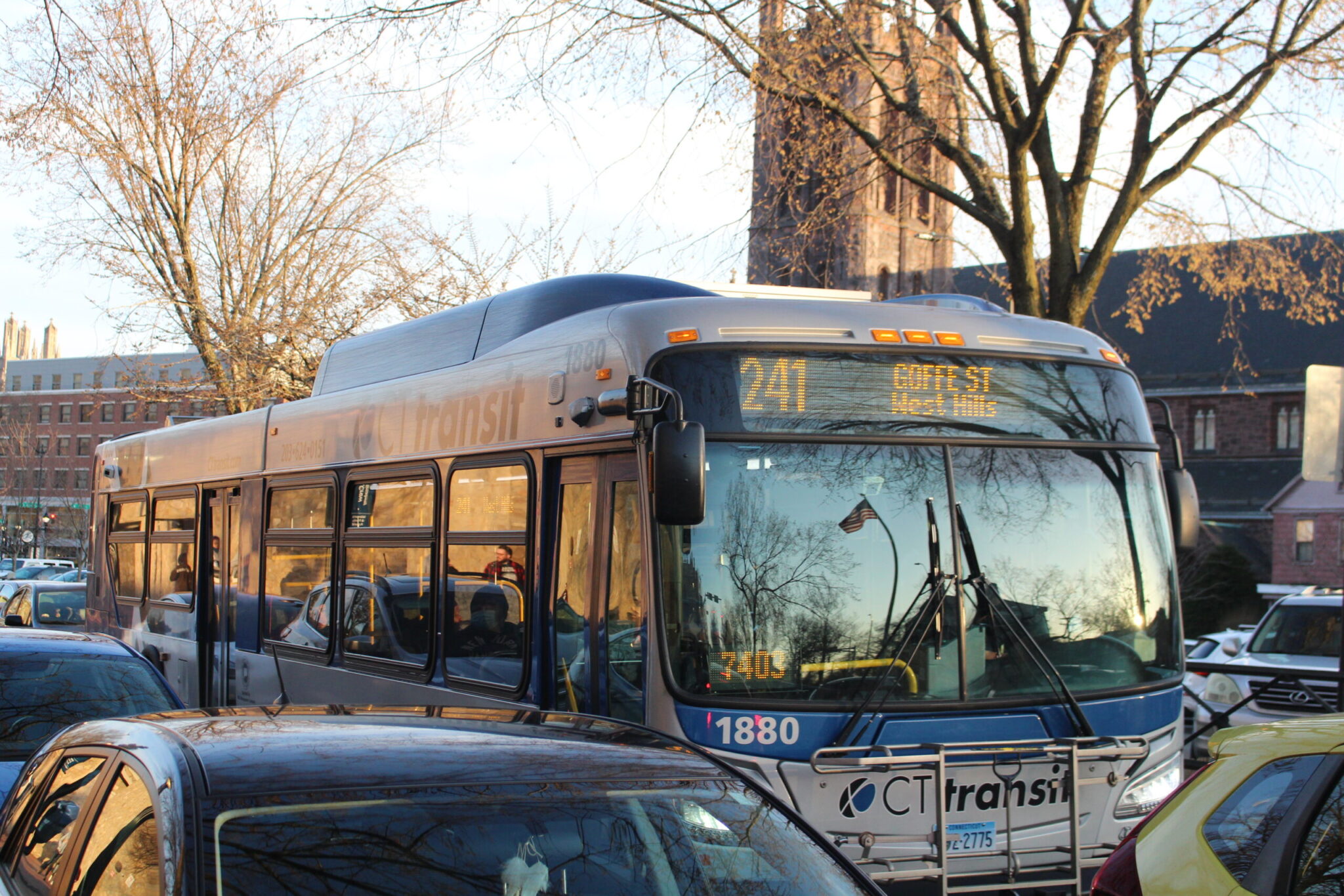Transportation Transformation resolution to be presented to Board of Alders this fall
The New Haven Climate Movement is drafting a resolution that calls for more climate-friendly transportation initiatives in New Haven as a way to reduce pollution.

Yash Roy, Senior Photographer
The New Haven Climate Movement calls for a consistent commitment to progress in the transportation sector in a new resolution it plans to present to the Board of Alders in late September or early October.
NHCM is calling for the City of New Haven to officially recognize the need for a safe, equitable, sustainable and environmentally responsible transportation network, as well as take immediate action and direct “adequate” financial resources toward this goal. Specifically, it would require the city to create a plan to reduce single-occupancy vehicle use and accelerate the implementation of the Safe Routes for All Active Transportation Plan, which was adopted in 2022 and lays out plans for a city-wide bicycle network and for pedestrian and transit improvements.
“New Haven was ranked the fifth most challenging place to live with asthma,” Suprya Sarkar, an NHCM member who has been involved in drafting the resolution, said. “A lot of people targeted by these health issues or these climate change disasters are people of color.”
The Asthma and Allergy Foundation of America, a non-profit organization that releases an annual list of “Most Challenging Places to Live With Asthma,” ranked New Haven fifth in 2021.
For Sarkar, New Haven’s air quality issues are directly linked to a “car-centric transportation system” — the widespread use of cars. She and other members of NHCM feel that a less pollutant transportation network is the key to addressing these health issues.
The youth drafting the “Transportation Transformation” resolution have been collaborating with multiple alders, including Eli Sabin and Caroline Tanbee Smith, the city’s director of climate and sustainability Steve Winter and Douglas Hausladen, executive director at New Haven Parking Authority, to ensure that the resolution is specific and actionable, as well as palatable to the Board of Alders.
If passed, the resolution will require the city’s Department of Transportation, Traffic & Parking to create a plan within six months that will reduce single-occupancy vehicle use while increasing bus, train, biking, walking and electric vehicle use by 2030. The resolution stipulates New Haven’s aim to achieve a 25 percent reduction in car trips by 2030
The resolution specifically requires the city to accelerate the implementation of the Safe Routes for All Active Transportation Plan and the mayor and alders to add $5 million to New Haven’s 2025-27 capital budget to accelerate the implementation of the plan.
Amelia Lee ’26, another NHCM member working on the resolution, said the existing infrastructure often feels unsafe or requires bikers to take inconvenient routes to their destinations. She thinks improving the biking infrastructure could significantly increase the number of people who choose to bike instead of drive.
Sarkar said the city has yet to commit significant resources to implementing the 2022 Safe Routes Plan, and this lack of action is one of the main reasons NHCM is writing the Transportation Transformation resolution.
Lee worries about the Board of Alder’s history of enacting transportation-related resolutions or plans and then failing to act on them. She said the organization has spent a lot of time revising the resolution to make it as actionable as possible and plans to work with Alder Sabin to find the best way to ensure this resolution is actually acted upon.
“There’s nothing in the Safe Routes plan that actually requires them to do anything. It just identifies problems with no action,” Lee said. “This resolution will require them to recognize the urgent need for a transformative approach to transportation.”
The resolution also reaffirms New Haven’s support for Connecticut to provide free bus fares to all seniors and minors to reduce pollution, support low-income families and foster sustainable urban mobility.
It also calls upon the Office of Climate and Sustainability to report the progress on emissions reductions to the Board of Alders each year to ensure that the alders have the information they need to meet the city’s transportation goals.
Manxi Han, chair of the NHCM’s climate education committee, hopes people will see the resolution as more than just an effort to provide equitable transportation access.
“We want to bring something new into this, which is how using buses, or having buses be free, can contribute to people using cars less. That overall will help the fight against climate change,” she said. “The transportation sector has a huge impact on carbon emissions, so we want to sort of frame that in that type of light, too.”
Sarkar hopes that the resolution, while not binding, will raise the issue of transportation in the city’s mind and inspire them to take more action to create a more climate-friendly system.
Human-induced climate change is projected to increase New Haven’s average temperature by up to five degrees Fahrenheit by 2050.
Interested in getting more news about New Haven? Join our newsletter!







